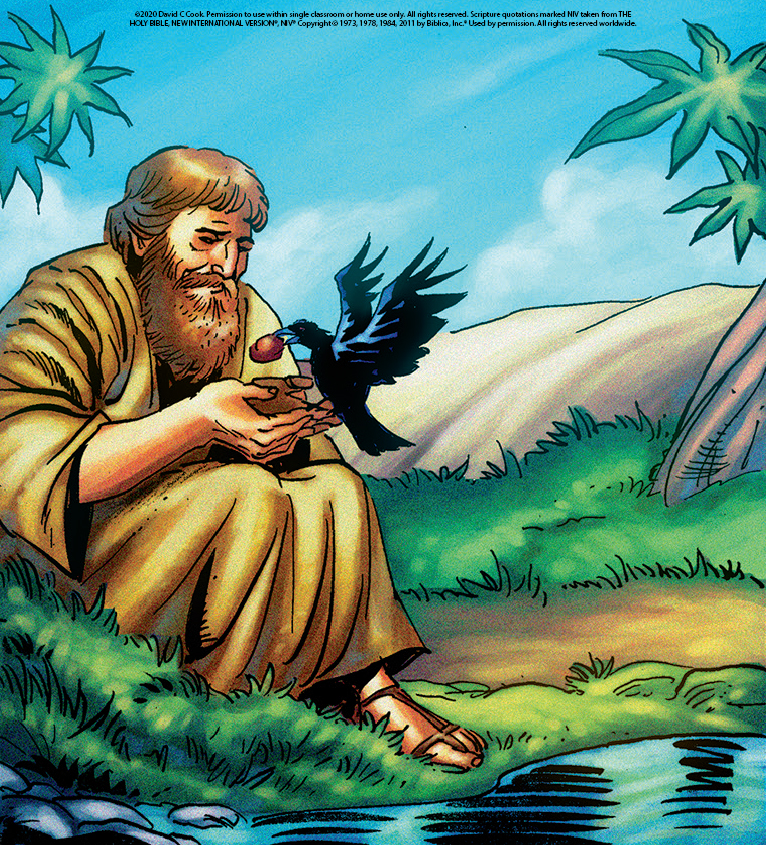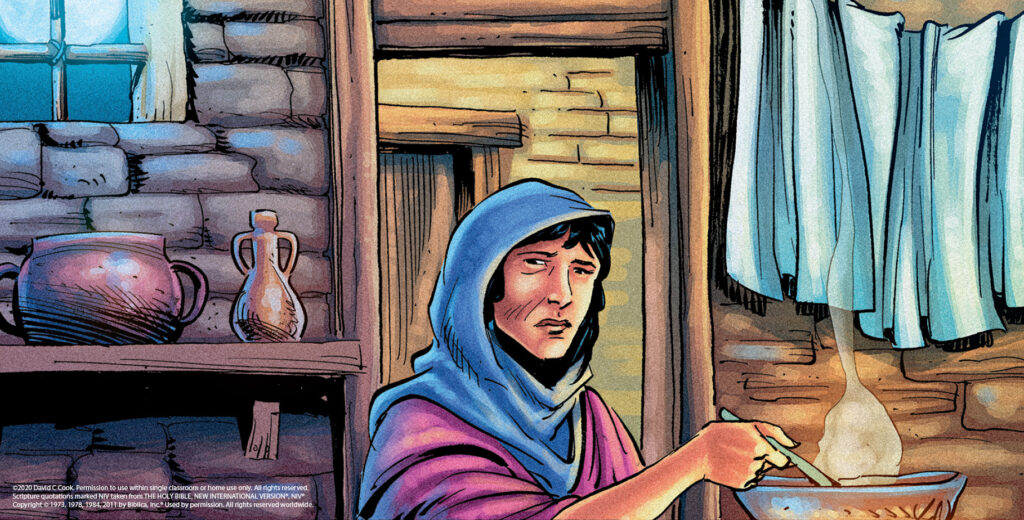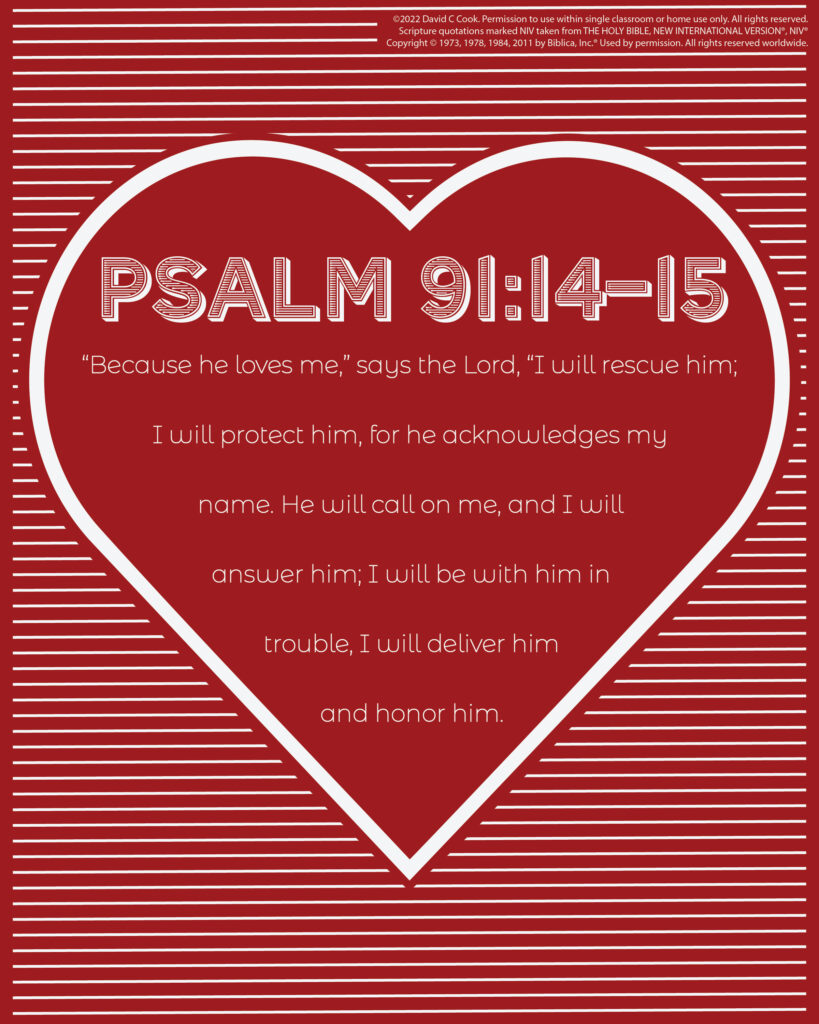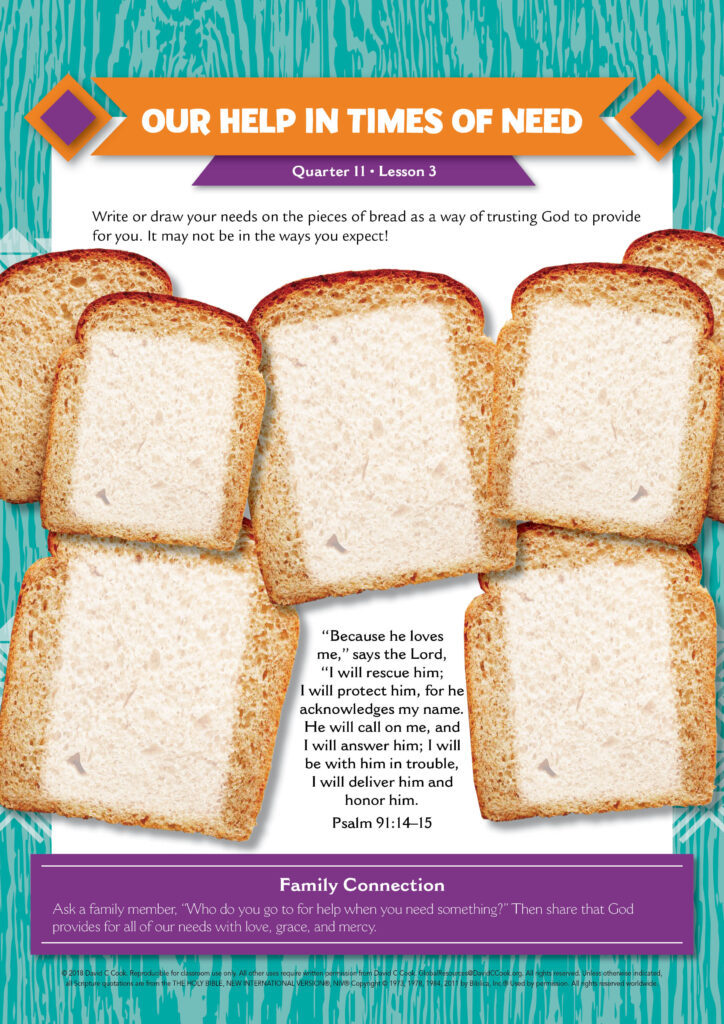During the lesson, the information for you to know is written in regular type, and what we suggest speaking or reading aloud to children is in bold. All resources for this lesson, including the Teacher Guide, Student Page, Family Connection Card, and other resources can be downloaded in a ZIP file by clicking on the following link:
In some lessons you will find "resource articles." These are articles written by experts from around the world to help equip you for your work with children and adolescents. Share them with parents or guardians if you consider it appropriate.
“Because he loves me,” says the Lord, “I will rescue him; I will protect him, for he acknowledges my name. He will call on me, and I will answer him; I will be with him in trouble, I will deliver him and honor him.
Psalm 91:14–15
We have all experienced the desperation that comes from an urgent need—a need that causes us to wonder how we will get through the difficulty. We may try to get through our problems with our own strength. Other times, we may give in to feelings of hopelessness and powerlessness. But the Bible promises that we can draw near to the One who knows all of our needs and He will provide help.
Think of a time you experienced great need. Did you rely on your own strength and intelligence to solve your problem? Or did you turn to God and ask for His help? While our human solutions may be helpful, true help comes from God. Call on the One who answers. Reach out to God, whose provision is greater than you could ever expect or imagine. He is with you—and His merciful help and gracious love are endless.
Encourage the teens to ask their family members, “Whom do you go to for help when you need something?” The teens can then share that God provides for all of our needs with love, grace, and mercy.
Teacher Tip: If possible, email or text the Family Connection Card to the families of your students.
Greet the teens as they arrive. Ask them to think about a time they may have experienced a
crisis situation.
Divide the teens into groups of 3–4. Share the following situation with them. Tell them to talk through what they would do in their groups. They should remain in their groups for the rest of the lesson.
Situation: A huge storm is headed toward your community. You and your friend hear the warning and begin running home to tell your families. Your friend falls down and hurts himself. He cannot walk on his own. If you stay and help him, you will not arrive home in time to warn your family about the danger. If you leave your friend where he is, he will not be able to escape the storm. What should you do?
Give the groups a few minutes to discuss their answers. Allow 2–3 groups to share their thoughts with the whole class. Then ask the following questions of the whole class.
When we face challenging situations or a crisis, we often react emotionally. Stress, fear, and anxiety can make it difficult for us to make wise decisions. But we are not alone in those times of need. God is with us, and He can guide us to do what is right.
Today we are going to learn about a man in the Bible named Elijah, who faced many difficult situations. Let’s talk about how he relied on God in challenging times.
Optional: If possible, share the images from The Action Bible.


Prophets are people sent by God to deliver His messages to His people. Elijah was a prophet in the Old Testament when a king named Ahab ruled Israel. Ahab did not obey God. He married a foreign woman named Jezebel, who worshipped an idol called Baal. She wanted all of Israel to worship this idol, too. God sent Elijah to tell Ahab and Jezebel that because of their idol worship, there would be no rain for a long time. Jezebel was very angry with Elijah.
Have the teens discuss their answers with their groups. Then allow 2–3 teens to share their ideas with the whole class. Repeat this for each set of questions in the teaching section.
God helped Elijah in his time of need by telling him to get away from Jezebel. Listen to what happened next.
Have a student read 1 Kings 17:5–6 aloud from the Bible. If that is not possible, the passage is printed here.
So [Elijah] did what the Lord had told him. He went to the Kerith Ravine, east of the Jordan, and stayed there. The ravens brought him bread and meat in the morning and bread and meat in the evening, and he drank from the brook.
1 Kings 17:5–6
After a time, the brook dried up because there had been no rain. But again God helped Elijah in his time of need. God told Elijah to go to Jezebel’s home country, and there he would meet a widow who would feed him. Elijah obeyed. When he came to the town gates, he saw a widow gathering sticks. Elijah asked her to bring him water and a piece of bread. The widow was very poor. Listen to how she responded to Elijah.
“As surely as the Lord your God lives,” she replied, “I don’t have any bread—only a handful of flour in a jar and a little olive oil in a jug. I am gathering a few sticks to take home and make a meal for myself and my son, that we may eat it—and die.” Elijah said to her, “Don’t be afraid. Go home and do as you have said. But first make a small loaf of bread for me from what you have and bring it to me, and then make something for yourself and your son. For this is what the Lord, the God of Israel, says: ‘The jar of flour will not be used up and the jug of oil will not run dry until the day the Lord sends rain on the land.’”
1 Kings 17:12–14
The widow did as Elijah had told her. There was food every day for Elijah, the woman, and her son. The jar of flour was never used up, and the jug of oil did not run dry.
Elijah had been hiding from Queen Jezebel for 3 years when God told him to return to Israel. God promised to send rain and end the drought. Elijah challenged King Ahab to a contest to see whose god was real—Baal or the Lord (Yahweh). The 400 prophets of Baal and many of the people of Israel met Elijah at the top of a mountain.
The prophets of Baal prepared a bull and placed it on an altar. They called out their god and asked him to send fire and burn the altar. But nothing happened. For hours they called to Baal, but he did not answer.
Optional: If you are using The NIV Action Study Bible, your students can read more about Baal in the “Ancient Archives” section near 1 Kings 16.
Next it was Elijah’s turn. He repaired the altar of the Lord and placed a bull on it. He dug a trench around the altar. He asked people to pour water on the altar. They continued pouring until the altar was soaked and the trench was full of water. Then Elijah prayed to God. Listen to Elijah’s prayer:
Answer me, Lord, answer me, so these people will know that you, Lord, are God, and that you are turning their hearts back again.” Then the fire of the Lord fell and burned up the sacrifice, the wood, the stones and the soil, and also licked up the water in the trench. When all the people saw this, they fell prostrate and cried, “The Lord—he is God! The Lord—he is God!”
1 Kings 18:37–39
Queen Jezebel was furious that God had won the contest and many people had chosen to follow Him. She had her men search for Elijah to kill him. Elijah ran in fear for his life.
For years, Elijah had trusted God in his times of need, but now Elijah felt sad and hopeless. He even told God he wanted to die. He had struggled through so many difficult situations that he was exhausted.
Elijah laid down and slept. An angel woke Elijah and told him to get up and eat. God had provided fresh baked bread and a jar of water. Elijah ate and drank and fell asleep again. Again, an angel woke him up to eat and drink. The food gave him amazing strength, and Elijah walked for 40 days and 40 nights until he reached a cave, where he spent the night. Then God spoke to him.
The Lord said, “Go out and stand on the mountain in the presence of the Lord, for the Lord is about to pass by.” Then a great and powerful wind tore the mountains apart and shattered the rocks before the Lord, but the Lord was not in the wind. After the wind there was an earthquake, but the Lord was not in the earthquake. After the earthquake came a fire, but the Lord was not in the fire. And after the fire came a gentle whisper. When Elijah heard it, he pulled his cloak over his face and went out and stood at the mouth of the cave. Then a voice said to him, “What are you doing here, Elijah?”
1 Kings 19:11–13
When Elijah felt sad and alone, God reminded him that he was not alone. There were several thousand people in Israel who had stayed true to God and had not worshipped Baal. Encouraged and refreshed, Elijah returned to Israel to again share God’s messages with the people of Israel.
Elijah faced many challenging situations! Yet through it all, God provided help and showed Elijah more about who He is. Elijah was never alone. God was with him and cared for him even in the most difficult situations.
What can we learn from Elijah’s story?
We learn that God is always trustworthy. No matter what our situations may be, we can trust Him. When we are in danger, when we are afraid, when we are in need, God is with us. He will help us.
We can learn that God also helps us in our times of need. When Elijah needed protection, God helped him. When Elijah needed food, God helped him. And when Elijah needed comfort, God helped him.
Sometimes God’s help does not come in the ways we expect. The Bible does not tell us, but Elijah probably did not expect to have ravens bring him food. He probably did not expect that he would have to work so long and hard to share God’s truth. He probably did not expect that he would feel lonely and rejected. But he trusted God even when it was difficult.
Sometimes God meets our needs by giving us the wisdom or opportunities we need to meet our needs. Sometimes He brings people into our lives who can help to meet our needs. Sometimes He even brings miracles, as He did for Elijah. However, no matter how He responds, God always hears us when we share our needs with Him. He is with us always, too—when we face challenges, when we are afraid, and when we are sad and lonely. We can always trust Him.
The Bible gives us encouragement for our times of need. Listen to this message that God delivered to His people about His care for those who love Him:
If you are using the Memory Verse Poster, show it to the students.
“Because he loves me,” says the Lord, “I will rescue him; I will protect him, for he acknowledges my name. He will call on me, and I will answer him; I will be with him in trouble, I will deliver him and honor him.
Psalm 91:14–15

What do you think it means that God rescues, protects, and delivers those who love Him?
Allow 2–3 teens to share their thoughts.
Do you think that means that all of our needs will disappear?
Allow 2–3 teens to share their thoughts. Then guide them to understand that God knows their needs and will always provide what is best for them in every situation.
You can share your needs with God. He listens, and He cares. Though He loves us completely, that does not always mean that all of the needs we think we have will be met.
Think about the needs you have now or the needs you have had in the past. It may be a physical need, such as food for your family. Or it could be an emotional need, such as healing from grief. It may be forgiveness for something you have done that hurt someone else or caused consequences for you. With your finger, draw a picture or symbol of that need on your palm.
Give the teens time to think and draw their pictures or symbols.
Optional: If you are using the Student Pages, allow the teens to draw their pictures on their pages.

Now hold your hand up to show God the picture or symbol. Ask Him to help you with your need. Ask Him to be with you.
If you are not ready to ask for God’s help, you can think about what could help you with your needs. Think about people you trust who might be able to help you with your needs.
Give the teens time to think and pray. Then close with a blessing based on Psalm 91:14–15:
Blessing: May you hold fast to God, who loves you completely. May you find peace in the knowledge that He will answer you in your times of need.
Lead the teens in singing this quarter’s song, if possible.
Life on Life ©2020 David C Cook. Reproducible for home or classroom use only. All other uses require written permission from David C Cook [email protected]. All rights reserved.